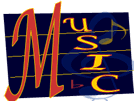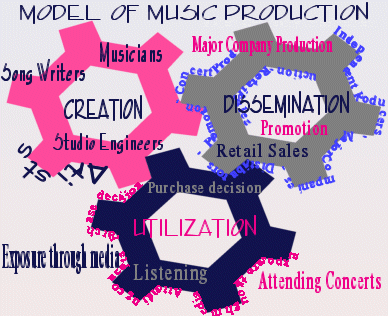BACKGROUND
= 
Many of my MLS projects have grown out of my love for music. It has really been exciting to combine my music background with my newly acquired library skills. Whether it is for a Digital Music Library Initiative, a Church Choir Needs Assessment, or helping a disabled boy find left-handed piano music, information if effectively used enhances music scholarship, performance, and life as a whole.
These Music-Related Projects demonstrate the following professional values I've acquired through my MLS Experience:
Advocacy, Vision, Leadership & Innovation
- Digital
Music Library Website
- This independent study project was the result
of my interest in
 learning
more about digital audio reserves. From the start I saw the opportunity
to move my own university into the modern era, and since completing
the website here I have put in motion a digital music reserve for Evangel's
Fall 2003 Classical/Romantic Music History class. (Spring
2003, LI 865/Independent Study, Roger Wyatt)
learning
more about digital audio reserves. From the start I saw the opportunity
to move my own university into the modern era, and since completing
the website here I have put in motion a digital music reserve for Evangel's
Fall 2003 Classical/Romantic Music History class. (Spring
2003, LI 865/Independent Study, Roger Wyatt)
Creativity & Imagination
Music
Publishing Industry Annual Report PowerPoint
-
As the culminating project for a specialized business
information class, this PowerPoint demonstrates the repackaging of complex
information in a creative, effective, and attractive package. After the
Annual Report's statement from the CEO of Jamambo Music, a music publishing
timeline is presented, current trends are highlighted and then charts
and graphs demonstrate what the competition is doing and what Jamambo
plans to do in the future. (LI 841/Advanced Retrieval and
Repackaging for Business and Industry, Andi Kounas, Fall 2002)
- Global
Music Industry Website -
To get a more well-rounded approach to music, I studied the business side of music and put together a website of information helpful to artists, companies, and others interested in issues such as music copyright. Though a bit more an imaginative than typical subject for a Global Information class, this project received high marks for both content and design. (Spring 2002, LI 806/Global Information Infrastructure, Roger Wyatt)

Application of Theories & Models to Diverse and Specialized Audiences
- Contemporary Christian Music - A paper which discusses the information transfer process (Creation, Dissemination, Organization, Diffusion, Utilization, Preservation, and Destruction) in the Contemporary Christian Music (CCM) Industry. By following this process one has a better understanding of the industry, especially its need for better preservation. (LI 803/Information Transfer and the Knowledge Society, Herbert Achleitner, Spring 2001)
- Left-Hand Guide - Besides being completely practical for the disabled teenage boy needing left-handed piano music, this was an opportunity to assess a need and work alongside a family to fill the need. I was able to find a great resource book listing repertoire, yet with a follow-up evaluation the greater need became simply how to go about finding and purchasing the music itself. The guide I created listed both local and larger music dealers, their phone numbers, websites and even some examples of how to get certain pieces that seemed to suit the boy's interest and skills level. (LI 802/Theoretical Foundations of Service: Diagnosis and Customization, Cynthia Akers, Spring 2002)
- Music
Theory Paradigm Paper -
This first paper for my introductory MLS
class discussed Music Theory in terms of a paradigm shift from the older
school of analysis to a new more free-flowing generation of music analysis.
It was a chance to review the material from my other masters and apply
new theories and models. (LI 801/Foundations of Information
Transfer, Roger Greer, Spring 2001)
Needs Assessment & Evaluation of Products
- Church Music Needs Assessment - The semester long course on assessing the needs of community hardly seemed enough time to develop a relationship with an organization and use various tools to understand needs. However, I already had a link to a Presbyterian Church in Kansas City, Missouri, so they became my community. Though the interviews and survey did not quite turn out as I expected with their wanting a small music resource center, I did learn much from the process, including most importantly the value of assessment. (LI 811/Inquiry and Analysis, Cecilia Salvatore, Fall 2001)
- Music
Notation and Sequencer Software Review - Given my
target audience of individuals wanting to investigate music notation
and sequencing softwares, I read extensively about the various products
and produced a simple three page overview of the top products, their
costs, advantages, and disadvantages.
(LI 841/Advanced Retrieval and Repackaging for Business and Industry, Andi Kounas, Fall 2002)
Acquistion of New Skills & Problem Analysis
- Music Cataloging Practicum - This document shows 1) my practicum prospectus, 2) schedule, 3) two action plans, and 4) self-reflections. As can be seen the experience was quite rigorous and included much hands-on experience cataloging music scores, records, and CDs. Also I was assigned hundreds of pages of reading in Music Librarianship (including Collection Development), and visited with the Head Music Librarian, the Special Collections Librarian, and the Head of the Marr Sound Archives. My required action plans included one regarding the UMKC music cataloging backlog and another promoting my working with the Music Listening Library at Evangel University, which I hope will be implemented in Fall 2003. (LI 870/Music Cataloging Practicum at UMKC, Wendy Sistrunk (UMKC) & Barbara Herrin (SLIM), Summer 2003)
Last Updated 8/8/03 by Jana M. Borchardt Email Comments